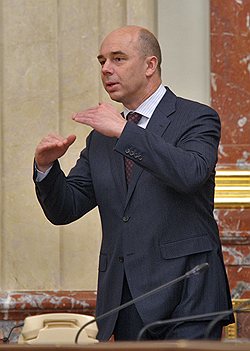After the ruble has lost almost 1% of its value during one trading session, First Deputy Prime Minister Igor Shuvalov rushed to assure the investing public that the government doesn’t plan any devaluation. Russians know that officials always say something like that when devaluation is inevitable. The ruble already sank by 8% from the beginning of the year. The revival of the American economy means that capital is flooding to the US, causing the selloff in the emerging markets.

The market has dropped after Finance Minister Anton Siluanov speculated that some weakening of the ruble would only help Russian economy. He announced that the government will start buying foreign currency on the market, not directly from the Bank of Russia. According to the minister, the new mechanism will cause the weakening of the ruble by 3-6% and bring the government around 6 billion dollars of additional income.
Additional tax income is the major rationale for the devaluation. The weak ruble will increase profits of Russian export industries (mainly oil and gas) and taxes from these industries. Because of the stagnant economy, the government collected in January-May 2013 about the same amount of taxes as a year ago. This amount is well below the budget forecast and means the drop in the government revenue in real terms.
As about additional economic growth, fueled by devaluation, it’s likely to be minuscule. In the domestic market Russian companies either compete with products from emerging countries, which devaluate currencies as well, or depend on import of parts and equipment from Europe.
The other side of devaluation is inflation. However, after the weakening of the ruble in 2008-2009 inflation decreased. The government probably hopes for the same outcome this time. However, current situation is different from the 2008 crisis. The collapse of oil prices in 2008 dried the flow of oil money into Russia, helping to curb inflation. The simultaneous weakening of the euro against the dollar also contributed to the stability on the consumer markets. Now the government will inject money into the economy, selling rubles from the sovereign funds. If the Central Bank doesn’t adsorb this money, it will boost inflation.
One-time effect from devaluation will help the government to finance its mandates, but trigger inflation expectations and make investments in Russia less profitable. The government tries to prolong current economic model, in which growth and political stability rest on the government expenditures. Only new crisis will make them change the course.





